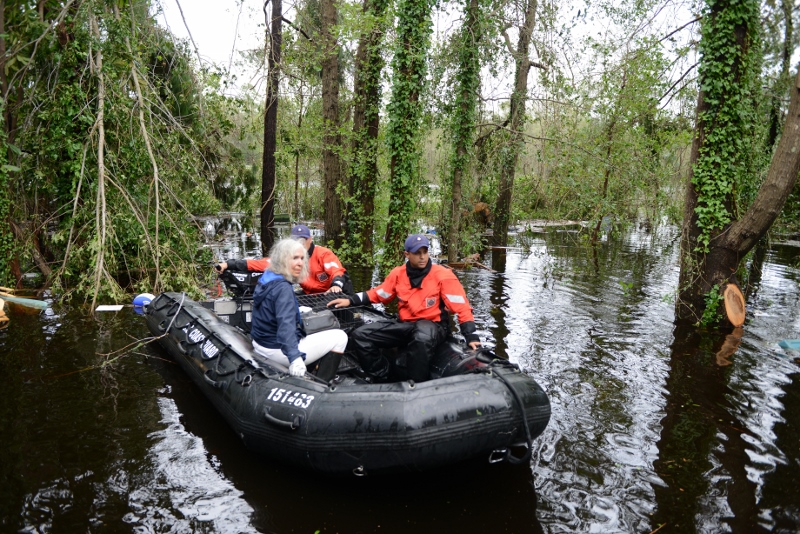Small boat rescue teams continue to evacuate hundreds from flooding in North Carolina, as rivers rise with the aftereffect of Hurricane Florence rainfall rushing toward the sea.
As of Tuesday morning more than 3,000 Coast Guard personnel were responding, along with other military units, urban rescue task forces operating under the Federal Emergency Management Agency, and state and volunteer forces.
Coast Guard helicopter crews operating out of Elizabeth City, N.C., and Savannah, Ga., and small boat crews had rescued 434 people and 234 pets by midday Tuesday morning. The Savannah aircrews completed sweeps of the Georgia and South Carolina coasts for persons in distress, and were redeploying to Myrtle Beach, S.C., as a forward location for operating over the North Carolina flood zone.
Meanwhile 35 shallow-water rescue boat teams were deployed across the region, Coast Guard officials said in an update statement. At least 32 deaths have been blamed on the storm.

Coast Guard personnel wait to be picked up by their rescue team after completing Hurricane Florence search and rescue operations in Brunswick County, N.C., Sept. 16. Coast Guard photo/PO3 Trevor Lilburn.
Florence made landfall on the morning of Sept. 14 as a category 1 hurricane, but the storm’s flooding impacts – from storm surge and heavy rains – surpass those of many historic hurricanes with higher wind speeds, experts say. At Elizabethtown, N.C. – about 50 miles inland and northwest of the hard-hit port of Wilmington – rainfall totaled nearly 36” in four days.
As Florence looped west and north as a tropical depression, more rain fell east of the Appalachian Mountains to flow back to the coastal plain, shutting down long stretches of I-95 in the Carolinas. Emergency managers expect flooding impacts to continue for days and possibly weeks, exceeding hurricane Matthew in 2016 and a storm in September 2015 that likewise sent river waters over the highways.
Wilmington itself remained nearly cut off by flood waters as the Cape Fear River and other streams continued to rise across the region. Coast Guard boat teams had to clear flooded roads of debris in four eastern North Carolina counties so small boats and high-water vehicles could reach people stranded.
The ports of Wilmington, Morehead City, and Georgetown, S.C., remained closed as the Coast Guard maintained port condition Zulu. Beyond the hurricane’s main impact zone the ports at Charleston, S.C., and Hampton Roads, Va., were fully open, with the Coast Guard urging mariners to proceed with extreme caution.
Seven Coast Guard buoy tenders were dispatched North Carolina to survey and open the ports of Wilmington and Morehead City, and help get the North Carolina ferry system up and running again. Four of the tenders were heading to Wanchese, Oak Island, and Atlantic City Beach on the state's barrier islands to assess waterway and port conditions.




